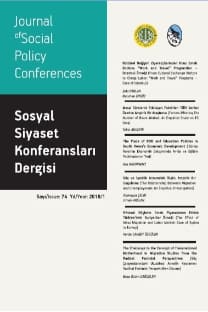BİLGİ TEKNOLOJİLERİNİ KULLANAN YENİ GİRİŞİMCİLİK MODELİNİN İŞ YARATMA ETKİSİ
Bilgi teknolojilerinin ortaya çıkması ve yaygınlasması hayatın içerisinde birçok değisiklikleri tetiklemistir. Bu değisimden süreç içerisinde bulunan toplumlar faydalandığı gibi ayrıca isletmeler, yöneticiler ve girisimciler faydalanmaktadırlar. Girisimciler firma yatırımlarında gerek maliyetlerini düsürmek gerekse katma değer sağlayan ürün ve hizmet üretebilmek için bilgi teknolojilerini en önemli avantaj olarak görmektedirler. Bilgi teknolojileri girisimciler için bilgiyi arama ve ulasma, haberlesme, üretimde otomasyon ve entegrasyon gibidesteklerden faydalanmak amacıyla kullanılmaktadır. Son yıllarda ortaya oldukça esnek, karar verme süreçlerinde hızlı, bilgiyi yoğun olarak is süreçlerinde kullanan, yenilikçi ve is yaratma etkisi olan girisimci tipi çıkmıstır. Bu bağlamda, girisimcilik ve bilgi ve iletisim teknolojileri iliskisini farklı yönleri ve karsılıklı etkilesimlerini dikkate alarak çalıstım.
Anahtar Kelimeler:
Girişimcilik, İş Yaratma, Bilgi Teknolojileri, Yeni Ekonomi, E–Ticaret
___
- Akgeyik, Tekin, “Türkiye Đçin Rekabetçi Üretim Ve Đstihdam Stratejileri”, Sosyal Siyaset Konferansları, Đstanbul Üniversitesi Đktisat Fakültesi Yay., Kitap 50, 2005.
- Bulut, Fiş, Aktan, Yılmaz, “Kurumsal Girişimcilik: Kavramsal Yapı Üzerine Bir Tartışma”, www.Yasar.Edu.Tr/Makale/10.Sayi/Kurumsal_Girisimcilik.Pdf, Çevrimiçi 27.09.2008.
- Chao–Tung Wen, Technocrats, Entrepreneurship, and The Development of E–Commerce as an Industry: Evidence from Apec Economies, Graduate Institute of Technology and Innovation Management, National Chengchi University, Taiwan, 2006.
- CFIB, The Canadian Federation of Independent Business guide to simplifying technology for business, çevrimiçi 20/10/2008 http://www.cfib.ca/en/savings– benefits/tech–guide1.pdf.
- Cox, Jonathan B., News & Observer, The (Raleigh, NC); 02/28/2007. Estrada M., “Bridging the Wireless Gap”, Knowledge Storm: The Upshot, October 2002, p.3, www.knowledgestorm.com/info, çevrimiçi 10–09–2008.
- Friedman, Thomas, The World is Flat, The Globalised World in the Twenty–First Century, Penguin Books, 2006.
- Gereffi, Gary, The New Offshoring of Jobs and Global Development, ILO Publications, International Labour Office, Geneva, 2006.
- Humphreys, P. and Brezillon, P. “Combining Rich and Restricted Languages in Multimedia: Enriching Context for Innovative Decisions”, Ireland: University College Cork, (2002) Oak Tree Press.
- ILO, Meeting the Young Employment Challenge, International Labour Office, Geneva, March 2001.
- ILO, Human resources development, employment and globalization in the hotel, catering and tourism sector, International Labour Office Report, Sectoral Activities Programme, Geneva, 2001.
- Laudon, Kenneth, Jane, Management Information Systems: Managing Digital Firms, Pearson Prentice Hall, Tenth Edition, 2007.
- L. Mann, Catherine, Achieving the Benefits of Connectivity and Global E–Commerce, Peterson Institute For International Economics, 2002.
- Luecke, Richard, Entrepreneur’s Toolkit, Tools and Techniques to Launch and Grow Your Business, Girişimcinin El Kitabı, Yeni Đşinizi Kurup Büyütmek Đçin Gerekli Araçlar ve Teknikler, Harward Business School Press, T. Đş Bankası Kültür Yay., Çev. Ümit Şensoy, Ocak 2008.
- Matlay, Harry, Westhead, Paul, “Virtual Teams and the Rise of e–Entrepreneurship in Europe”, International Small Business Journal, SAGE Publications, 2005, Vol. 23(3)
- Mc Kay, Marshall, Strategic Management of eBusiness, Australia, John Wiley and Sons, 2004.
- OECD, SME and Entrepreneurship Outlook, OECD Publishing, 2005, Paris Özdemir, Süleyman; Ersöz Y., Halis; Sarıoğlu, H. Đbrahim, Đşsizlik Sorununun Çözümünde KOBĐ’lerin Desteklenmesi, ĐTO yayınları, 2006.
- Öztürk, Đbrahim, 2008 Girişimcilik Raporu, ĐGĐAD, s.7, Çevrimiçi 20/10/2008, http://www.igiad.com/books/girisimcilik_raporu.pdf.
- Parker, Rachel “The Myth of the Entrepreneurial Economy: Employment and Innovation in Small Firms”, Work Employment Society, Sage Publications, 2001.
- Phillips, Bruce D., “Home–Based Firms, E–Commerce, and High–Technology Small Firms: Are They Related?”, Economic Development Quarterly, Vol. 16 No. 1, Sage Publications, February 2002.
- Rutkowski, Jan, Firms, “Jobs and Employment In Moldova”, World Bank Policy Research Working Paper 3253, March 2004.
- Schoof, Ulrich, Stimulating Youth Entrepreneurship: Barriers and Incentives To Enterprise Start–Ups By Young People, Small Enterprise Development Programme, Job Creation and Enterprise Development Department, International Labor Office, Geneva, 2006.
- Spencer, Aron S., Bruce A. Kirchhoff, Craig White, “Entrepreneurship, Innovation, and Wealth Distribution: The Essence of Creative Destruction”, International Small Business Journal, Sage Publications, 2008.
- Tobias, Kollmann, What is e–entrepreneurship? – fundamentals of company founding in the net economy, Int. J. Technology Management, Vol. 33, No. 4, 2006.
- Turban, Efraim, Electronic Commerce A managerial Perspective, Pearson Prentice Hall, 2006.
- United Nations, Entrepreneurship and E–Business Development for Women, United Nations Publication, 2006.
- Von Her, James, Walsh, Steven, “Entrepreneurship, Emerging Technologies, Emerging Markets”, International Small Business Journal, Sage Publications, 2008.
- Weick, K. “Puzzles in Organisational Learning: An Exercise in Disciplines Imagination”, British Journal of Management, (2002), 13(3).
- Whiteley, David, E–Commerce Strategy, Technologies and Applications, Mc Graw Hill, 2006.
- Zhao, Fang, Entrepreneurship and Innovation in E–Business: An Integrative Perspective, Idea Grup Publishing, Rmit University, Australia.
- ISSN: 1304-0103
- Yayın Aralığı: Yılda 2 Sayı
- Başlangıç: 1948
- Yayıncı: İstanbul Üniversitesi Yayınevi
Sayıdaki Diğer Makaleler
İŞLETMELERİN SOSYAL SORUMLULUK ANLAYIŞININ GELİŞİMİNDE MESLEK KURULUŞLARININ ROLÜ
KÜRESELLEŞME VE REFAH DEVLETLERİ ÜZERİNDEKİ ETKİLERİ
SOSYAL SORUMLULUK RAPORLARINDA ÇALIŞMA VE İSTİHDAM GÖSTERGELERİ
YOKSULLUĞA VE YOKSULLARA DÖNÜK AHLAK YAKLAŞIMLARI
KÜRESEL İŞSİZLİK VE İSTİHDAMDA YENİ PERSPEKTİFLER
ÖZEL İSTİHDAM BÜROLARI: TÜRKİYE ÖRNEĞİ
BANKACILIK SEKTÖRÜNDE GLOBAL SERMAYE HAREKETLERİ: YÖNÜ VE YANSIMALARI
GEÇİŞ EKONOMİLERĐNİN DÖNÜŞÜM SÜRECİNDE AVRUPA BİRLİĞİ ÜYELİĞİ VE İSTİHDAM
